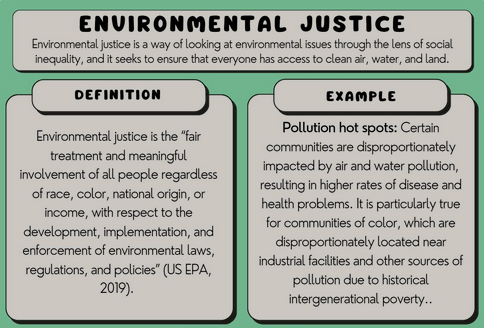Addressing issues of social and environmental justice requires a comprehensive and collaborative approach that involves individuals, communities, businesses, governments, and civil society. This study focuses on how to address issues of social and environmental justice:

Social Justice:
Promote Equal Opportunities:
Advocate for policies and practices that ensure equal opportunities for all individuals, regardless of their background, gender, race, ethnicity, or socioeconomic status.
Support Education and Awareness:
Invest in education and awareness programs that promote understanding, tolerance, and empathy. Education is a key tool in addressing stereotypes and biases.
Advocate for Inclusive Policies:
Advocate for and support the implementation of inclusive policies that address systemic inequalities. This may include policies related to hiring practices, education, healthcare, and criminal justice.
Community Empowerment:
Empower marginalized communities by providing access to resources, education, and opportunities. Support community-led initiatives that aim to uplift and strengthen vulnerable populations.
Address Discrimination and Bias:
Work towards eliminating discrimination and bias in all sectors, including employment, housing, and education. Encourage organizations to implement diversity and inclusion practices.
Criminal Justice Reform:
Advocate for reforms in the criminal justice system to address issues such as racial profiling, unfair sentencing, and the over-policing of certain communities.
Healthcare Equity:
Support initiatives that aim to improve healthcare access and outcomes for underserved communities. Address healthcare disparities and work towards equitable distribution of healthcare resources.
Affordable Housing:
Advocate for policies that ensure affordable and accessible housing for all. Address gentrification and displacement issues that disproportionately affect marginalized communities.
Promote Economic Justice:
Support fair wages, workers’ rights, and economic policies that address income inequality. Advocate for access to economic opportunities for all individuals.
Policy Advocacy:
Engage in policy advocacy at local, regional, and national levels. Work with policymakers to enact legislation that promotes social justice and equality.
Environmental Justice:
Community Engagement:
Involve local communities in environmental decision-making processes. Ensure that communities affected by environmental issues have a voice in policies and projects that may impact them.
Environmental Education:
Promote environmental education to raise awareness about the impact of environmental issues on marginalized communities. Empower communities with knowledge to advocate for their environmental rights.
Combat Environmental Racism:
Address instances of environmental racism where vulnerable communities are disproportionately affected by pollution, hazardous waste, and other environmental hazards.
Access to Clean Water and Air:
Advocate for and work towards ensuring that all communities have access to clean water and air. Address disparities in environmental quality that affect marginalized populations.
Sustainable Urban Planning:
Encourage sustainable and equitable urban planning practices that prioritize green spaces, public transportation, and environmental improvements in underserved communities.
Renewable Energy Access:
Support initiatives that provide access to renewable energy in disadvantaged communities. Advocate for policies that promote the transition to clean energy in an inclusive manner.
Environmental Regulations and Enforcement:
Advocate for strong environmental regulations and ensure their equitable enforcement. Hold industries accountable for their environmental impact, especially in areas where vulnerable communities reside.
Corporate Responsibility:
Encourage businesses to adopt sustainable and socially responsible practices. Support companies that prioritize environmental and social justice in their operations.
International Cooperation:
Collaborate globally to address environmental justice issues. Recognize that environmental challenges often cross borders, and international cooperation is essential for comprehensive solutions.
Legal Advocacy:
Engage in legal advocacy to ensure that environmental justice issues are addressed within the framework of existing laws. Support legal actions that seek to rectify environmental injustices.
Community Resilience:
Build community resilience to climate change and other environmental challenges. Support initiatives that empower communities to adapt and respond to environmental threats.
Data Collection and Research:
Support research and data collection efforts that highlight the intersectionality of social and environmental justice issues. Use data to advocate for evidence-based policies and interventions.
Remember that addressing social and environmental justice requires ongoing commitment, collaboration, and a sustained effort from individuals, organizations, and governments. Sustainable change often comes from a combination of policy advocacy, community engagement, education, and a shared commitment to justice and equality.
